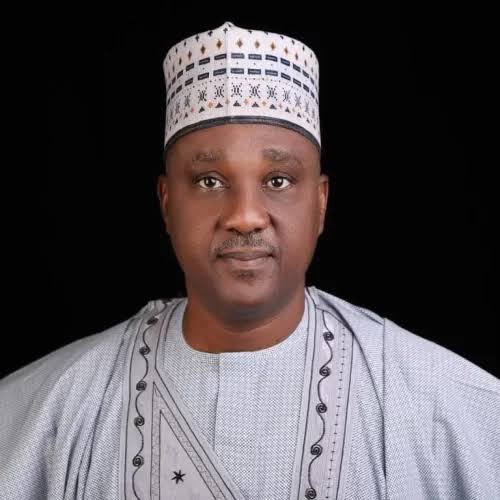society
Tajudeen Abass: A Symbol Of Parliamentary Stability By Toby Prince

Tajudeen Abass: A Symbol Of Parliamentary Stability
By Toby Prince
To whom much is given, much is expected, so they say. But if much is given to you and you’re empty, you will dash the expectations of the waiting public.
For Rt. Hon Tajudeen Abbas, much was given to him and daily, he has continued to surpass all expectations. The number of votes he garnered to emerge Speaker of the 10th Assembly and the 15th Speaker of the Nigerian House of Representatives, 353 out of 359, speaks volumes about his personality and his acceptability by his colleagues. He left his other two challengers with only six votes to share among themselves to preserve their dignity.
For every election circle in the last 13 years, of which we have had 4 of them, Hon Abbas has been consistently elected by the people of Zaria Federal Constituency to represent them in the Green Chamber. Coming from the Zazzau Emirate in Kaduna State that boasts of so many intellectuals and electable materials, the confidence reposed in him by his people is a testament to his strength of character and expertise in the management of human resources and relations.
Rt. Hon Abbas was first elected in 2011 on the platform of the Congress for Progressive Change (CPC) at a time when the ruling Party in Kaduna State was PDP and one of their son and former Governor of the State, Arc. Namadi Sambo was the Vice President of Nigeria and running mate of the PDP presidential candidate in that year’s election.
A crown prince of the Zazzau Emirate otherwise known as Zaria, with the traditional title of Iyan Zazzau, Hon Abbas’ organic relationship with his people which he has now deployed in managing the House of Representatives can not be divorced from the career path he chose for himself after school. With all the opportunities available for a prince like him, he waved the privileges and went back to his roots to share the little knowledge he had acquired with the future generation by becoming a primary school teacher. He moved from there to become a lecturer at the Nuhu Bamali Polytechnic otherwise known as the Kaduna State Polytechnic and later moved to the Kaduna State University where he taught between 1993 to 2001. Today, there’s no facet of life in his community where you will not find one of his former students. That’s how to lay a solid and lasting foundation.
With a Bachelor’s and Master’s Degree in Business Administration from Ahmadu Bello University Zaria and a Doctorate Degree in Business Management from the Usman Danfodio University Sokoto, Rt. Hon Abbas is the first Doctorate Degree holder to be elected Speaker of the Nigerian House of Representatives. Coming from the Northern region believed to be backwards educationally, this is indeed a commendable feat.
Before venturing into politics in 2010, Hon Abbas had a brief stint in the private sector as he worked as a Marketing Manager at the Nigerian Tobacco Company, now known as the British-American Tobacco Company of Nigeria. His vast experience as a classroom teacher saddled with the responsibility of managing pupils and moulding their character and future, and his marketing skills in selling products prepared him adequately for the position he occupies today and the maturity he brings to the job is glaring for all to see.
Of his activities in parliament, between 2015 and 2019, Dr. Abbas is reported to have sponsored the highest number of bills in the 8th Assembly. Coming to the 9th Assembly between 2019 and 2023, he broke the glass ceiling by sponsoring a total of 74 bills out of which 21 were approved by the two chambers of the National Assembly, forwarded to the then President, Muhammadu Buhari for his assent and were signed into law. This is a new record for a legislator in any parliament across the continent of Africa.
He also served in different committees in the House between 2011 and 2023 and has an in-depth knowledge of the workings and functions of every committee in the House. He was the chairman of the House Standing Committee on Land Transport in the 9th Assembly, his last position before emerging as Speaker of the House. As Speaker, he saw the need to create monitoring and evaluation committees to help the House follow the implementation of projects to its logical conclusions which has given the House a handle on their oversight responsibilities.
Considering the amount of peace and tranquillity brought to the House by the Rt. Hon. Femi Gbajabiamila’s tenure as Speaker of the 9th Assembly, which was a sharp departure from what was obtainable in the 8th Assembly headed by Hon. Yakubu Dogara, Dr Abbas was stepping into a big shoe that many would have thought was oversized for him. But as gentle as a dove, he has raised the bar of leadership by being inclusive and embarking on extensive consultation with his colleagues before making decisions that impact everyone.
Hon Abbas sees himself as primus inter pares. He knows he’s first a representative of a federal constituency like all his other colleagues and his position as Speaker is as a result of the trust of his colleagues. In less than one year into the life of this parliamentary assembly populated by many freshers, Hon Abbas knows every one of the other 359 members by name, thereby giving every member a sense of belonging. This indeed can only be the hallmark of a teacher. As an experienced parliamentarian, the Speaker know exactly what his new colleagues need to know to excel in their legislative and oversight responsibilities and has continued to organise seminars, conferences and workshops for them to acquire these needed skills.
Considering the aloofness of the Executive arm of government to the immediate and peculiar needs of the different constituencies, the honourable speaker insists that constituency projects will continue to be part of the budgeting process. In his words, “By tailoring projects to the local context, we ensure that development is not just a concept discussed in the halls of the legislature but a reality experienced in the streets, villages and towns in Nigeria”. He made this statement at the inauguration of some constituency projects attracted by his predecessor and current Chief of Staff to the president, Rt. Hon Femi Gbajabiamila in Lagos. He derided critics of the scheme and promised to revive the ”Constituency Development Fund Bill” to institutionalise the scheme. This indeed gladdens the heart of his colleagues who know that without the Zonal Intervention Projects otherwise known as constituency projects, government presence will never be felt in their various communities that are not very visible on the national map.
At the presentation of the 2024 budget to the joint session of the National Assembly which was President Tinubu’s first since assuming office, Hon Abbas emphasised the importance of a peaceful working relationship between the executive and legislative arms of government. He promised that “the national assembly will support the government’s policies and programmes targeted at alleviating poverty, economic restructuring and diversification, as well as general social sector reform and development”.
But in working with the executive, Mr Speaker knows that the ultimate goal is the people and that’s why he informed the president and his entourage that “while we’ll give the budget accelerated consideration, we will diligently scrutinize it alongside Nigerians to ensure that when it is passed, it will be a budget that best addresses the most critical needs of our people”.
To the delight of his colleagues, Rt Hon Abbas has pushed over 50% of votes allocated to his office as Speaker to his fellow members and has continued to dip into his reserves to intervene on behalf of any member in critical or urgent need of a project. The Speaker considers the constituents of his colleagues as his and goes the extra mile to put smiles on the faces of Nigerians.
As we approach the first anniversary of this stable and inclusive session, members of the 10th Assembly could not have asked for a better leader than what they have got. With Rt Hon Tajudeen Abbas as Speaker, Members are guaranteed a memorable tenure as the focus of his leadership is to help his colleagues achieve their set goals.
With Rt Hon. Abbas as Speaker, Nigerians are assured of progress, peace and prosperity. The nation will continue the trajectory of transformation and consolidation. All we can do as citizens is to pray and support this God-sent leader.
Toby wrote this piece from Abuja.
society
Ajiran Youth Protest Over Deaths of Two Residents, Demand Justice

Ajiran Youth Protest Over Deaths of Two Residents, Demand Justice
The Ajiran community of Lagos State erupted in a powerful protest on Tuesday as local youths took to the streets to express their grief and anger over the tragic murders of Prince Ademola Akintoye and Sherrif Agboworin. The demonstration follows the recent decision to reopen the murder case, an investigation that has already led to the arrest of over nine suspects in connection with the heinous crimes committed more than a year ago.
Carrying vibrant banners and poignant posters featuring the faces of the deceased, the protesters marched through the heart of their community while singing somber dirges to honor their memory. With chants of unity and justice ringing in the air, they called on both the Lagos State Government and the Lagos State Police Command to ensure that those responsible are swiftly and decisively brought to justice.
The youth leaders emphasized that peace and normalcy will remain elusive in Ajiran until all those complicit in the killings are held accountable. They articulated that true justice is the only way to restore tranquility and honor the lives of Akintoye and Agboworin, whom they described as innocent victims of a grave injustice.
Speaking on behalf of the demonstrators, youth leader Mr. Kehinde Oladele urged law enforcement to conduct a thorough and fair investigation. He asserted that every individual involved including the nine arrested suspects must face the full extent of the law. Especially Hammed Tajudeen, the principal suspect mentioned by others in custody, whom they believe should not escape scrutiny.
“The reopening of this case after more than a year is a critical first step towards achieving justice and fairness for our brothers,” Oladele said. “We urge the police to get to the root of the matter. Those mentioned during the investigation, especially Hammed Tajudeen, should not be spared.”
The atmosphere in the community grew increasingly tense last week following speculation that prominent businessman Aare Bashir Olawale Fakorede was implicated in the unrest. The speculation appeared to stem from his alleged influence on the reopening of the murder investigation. This misunderstanding escalated when a group of protesters targeted his filling station in Ikate, vandalizing his properties and disrupting business operations in the gas station based on the false assumption that Fakorede was behind the police’s renewed inquiries.
In response to the rising tensions and misinformation, Fakorede’s spokesperson, Ola Muhammed, issued a comprehensive statement denying any connection between Fakorede and the unrest. The spokesperson emphasized that rumors suggesting the businessman orchestrated the revival of the murder case were completely unfounded.
“I feel it is crucial to clarify, for the sake of transparency and historical accuracy, that this entire ordeal is in no way related to me,” Fakorede stated. “I am also very interested to see that the culprits are brought to book. I categorically affirm that I have never been involved in any business dealings with Mr. Hammed Tajudeen.”
Fakorede further elaborated that the recent protests which led to the destruction of his property were reportedly instigated by Tajudeen and others who seem determined to manipulate the narrative and cast suspicion upon him. Fakorede expressed his own strong commitment to uncovering the truth surrounding the deaths.
As the police investigation progresses, it has become increasingly apparent that all accusing fingers are pointing to Hammed Tajudeen who is currently evading capture, adding another layer of complexity and urgency to the ongoing situation. Community members have questioned why he remains at large instead of submitting himself to the police for questioning if he is truly innocent of the allegations against him.
Community leaders are now emphasizing the need for dialogue to address the root causes of the unrest and work toward restoring harmony within Ajiran, even as the demand for justice remains at the forefront of public consciousness.
society
Ramadan: Al-Yusuff International Travels and Tours Boss Greets Muslims

Ramadan: Al-Yusuff International Travels and Tours Boss Greets Muslims
As the holy month of Ramadan begins across the globe, the Chief Executive Officer of Al-Yusuff International Travels and Tours Limited, Dr. Abdulmajeed Oladele, has extended his heartfelt greetings to Muslims worldwide.
In his message, the respected business mogul expressed gratitude to Almighty Allah for the privilege of witnessing this year’s sacred month.
“We glorify Allah for granting us the grace and opportunity to witness this year’s month of blessings. Ramadan is a sacred and special month for all Muslims, a month greater than many others, filled with piety, mercy, and abundant blessings.
I congratulate all Muslims across the world. Let us faithfully observe the requirements of Ramadan. May Allah (SWT) grant our heart’s desires and make this period easy and rewarding for us all.”
Dr. Oladele urged Muslims to embrace the spiritual significance of Ramadan through devotion, charity, self-discipline, and prayers for peace and prosperity.
society
UKA UNVEILS THREE-TIER ATC PLATFORM AS MONARCH ANNOUNCES $10BN GOLD-BACKED MILESTONE

UKA UNVEILS THREE-TIER ATC PLATFORM AS MONARCH ANNOUNCES $10BN GOLD-BACKED MILESTONE
Emperor Nobilis Prof Solomon Winning declares global recognition of ATC ecosystem, urges citizens and partners to embrace unified digital, crypto and gold-backed financial structure
The Reigning Monarch of the United Kingdom of Atlantis (UKA), Emperor Nobilis Prof Solomon Winning, has formally announced what he described as a historic milestone in the financial evolution of the Atlantis nation and empire worldwide, the consolidation and global recognition of the ATC financial ecosystem backed by a $10 billion gold reserve.
In a voice message released from the Office of the Throne, the Monarch expressed gratitude to God and to citizens and partners across the globe for what he termed a “defining achievement” in the journey of the United Kingdom of Atlantis.
According to him, the ATC asset structure, supported by a $10 billion gold-backed certificate, has now been positioned among the world’s leading capitalisation financial platforms, ranking number 12 globally.
“We appreciate God for the milestone achieved of our 10 billion gold-backed certificate of ATC assets. We are delighted to inform our esteemed citizens, partners, viewers and friends all over the world that ATC has come to stay,” the Monarch declared.
Three Distinct but Interconnected ATC Platforms
Emperor Winning explained that the UKA Government and the Atlantis nation have officially released three integrated ATC platforms to the general public. He emphasised that while each platform serves a distinct purpose, they are structured to interact seamlessly for effective management, business transactions and global trading operations.
1.ATC Digital (Government Platform)
The first platform, known as ATC Digital, is the official government-backed digital transaction system. It is designed to facilitate digital financial operations within the UKA ecosystem and serve as the administrative and transactional backbone of the nation’s digital economy.
The Monarch described it as the formally recognised digital framework governed directly by the government under the Throne.
ATC Gold Version (Business and Trade Platform). The second platform, referred to as the ATC Gold Version, is primarily tailored for business trade, commercial exchange and transactional fluidity. It is structured to enhance business-to-business engagement, exchangeability and broader economic interaction.
“This version is mainly for business trade, business exchange and commercial transactions,” he clarified.
ATC Crown Coin (Crypto and Visitor Platform)
The third platform, known as the ATC Crown Coin, represents the Atlantis Crown Coin and is linked to what the monarch described as the Atlantean Bank Gold structure. This version operates as a crypto and digital hybrid, including visitor engagement capabilities and broader exchange functions.
(atlantisgoldbank.org
The Digital/Cryto currency Version
Atlantian Crown Gold (E-ATC) https://share.google/a7Jns9VtrMKCZ6Prk
The E-ATC purely for Trading and Exchang
Atlantean Crown (ATC) – The Future of Digital Currency https://share.google/1EhdkkDBFvBLLgfR1
The Digital version for Government
We also Have DEOS INTERNATIONAL Bank (DIB)
And ATCB)
The Monarch indicated that all three platforms are interconnected to ensure efficiency, transparency and global recognition.
“Please do not be confused. The United Kingdom of Atlantis has three major versions of ATC. Two are crypto-based, one is digital; one is also a hybrid of crypto and digital. All three interact together for effective management and effective business transactions.”
Global Recognition and Expansion Vision
Emperor Winning further asserted that the ATC ecosystem is already recognised internationally and positioned within the global financial framework. “Our platforms are presently recognised in the whole world,” he said, while encouraging existing holders of ATC assets to remain confident in the system.
He congratulated all ATC holders and reiterated the Throne’s commitment to strengthening the ecosystem’s credibility, usability and cross-platform functionality.
A Strategic Financial Architecture
Observers say the three-tier structure reflects an attempt by the United Kingdom of Atlantis to create a multi-layered financial architecture combining government-regulated digital systems, crypto-based trade platforms and gold-backed reserve credibility.
By integrating digital governance with cryptocurrency and gold certification, the UKA appears to be positioning ATC as both a sovereign-backed asset and a tradable global instrument.
As the UKA advances its financial ambitions, the monarch’s message signals a push for adoption, participation and global engagement with the ATC ecosystem.
“If you are a holder of ATC, congratulations to you from the Throne. God bless you,” the monarch concluded.
The development marks another significant chapter in the evolving digital and gold-backed finance narrative emerging from the United Kingdom of Atlantis.
-

 celebrity radar - gossips6 months ago
celebrity radar - gossips6 months agoWhy Babangida’s Hilltop Home Became Nigeria’s Political “Mecca”
-

 society6 months ago
society6 months agoPower is a Loan, Not a Possession: The Sacred Duty of Planting People
-

 news6 months ago
news6 months agoTHE APPOINTMENT OF WASIU AYINDE BY THE FEDERAL GOVERNMENT AS AN AMBASSADOR SOUNDS EMBARRASSING
-

 society5 months ago
society5 months agoReligion: Africa’s Oldest Weapon of Enslavement and the Forgotten Truth










